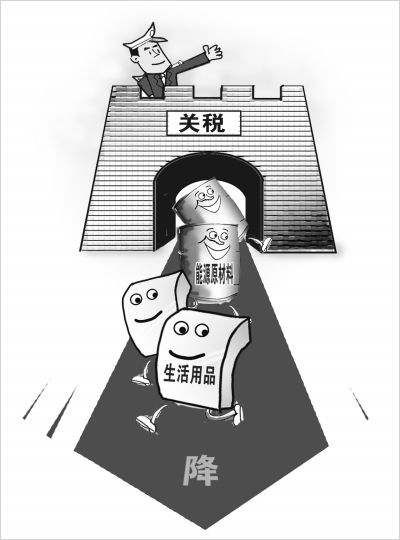China to cut import duties
 0 Comment(s)
0 Comment(s) Print
Print E-mail China.org.cn, March 31, 2012
E-mail China.org.cn, March 31, 2012
China, the world's second-biggest importer, will cut import duties on selected energy products and raw materials as well as consumer goods to boost purchases, the State Council said in a statement on Friday.
 |
|
To boost imports, the State Council?will cut duties on some energy products, raw materials, consumer goods closely related to people's daily lives, and key items that China does not produce. |
The decision underlines Beijing's intent to buy more from its trade partners to boost domestic consumption and comes after China posted its largest monthly trade deficit in at least a decade in February.
It is the first time the State Council has devoted a regular meeting to the issue of boosting imports, which is usually the responsibility of the Ministry of Commerce.
"As we maintain stable growth in exports, we should focus more on imports and appropriately expand its amount," the State Council said in a meeting.
China, the world's largest exporter, will have to rely less on exports to drive its economy in coming years, when growth in the US and European markets is predicted to slow.
Importing more will lift living standards and ease China's disputes with its trade partners, according to the ministry.
Vice-Premier Li Keqiang said earlier this month that China will import US$10 trillion worth of goods and services in the five years ending 2015.
Wang Shouwen, director of the ministry's department of foreign trade, said on Friday that China is set to boost imports of capital goods and consumer goods as the country plans to further diversify and expand imports.
"One of the ministry's top trade priorities this year is...to increase imports of capital goods, especially spare parts, and consumer goods," Wang said at an Import Expansion and Balanced Trade Development Forum in Kunshan, Jiangsu province.
According to the ministry, China's imported goods are currently divided into three main categories: capital, consumer and resources. Resources such as iron ore, copper and aluminum comprise the majority of the country's total imports.
"Encouraging the import of capital goods such as advanced spare products is undoubtedly helpful to upgrading China's industry, the promotion of investment efficiency and improving international competitiveness," Wang said.
To boost imports, the State Council said it will cut duties on "some energy products, raw materials, consumer goods closely related to people's daily lives, and key items that China does not produce".
China's import tariffs on energy products are generally low. For instance, an import duty of 1 percent is levied on mainstream gasoline products and diesel is duty-free.
Beijing will also encourage importers to buy more from countries that have free trade agreements with China, such as Pakistan, New Zealand, and member countries of the Association of Southeast Asian Nations.
The new move is expected to reduce China's trade surplus by increasing imports, which may help reduce trade frictions with other countries, experts said.
At present, China has trade surpluses with 75 percent of its trading partners, resulting in a series of disputes and protectionist barriers, according to the ministry.
To transform into a more consumer-driven economy, Beijing is adopting a "buy more but not sell less" approach, which helped narrow its trade surplus by 14.5 percent in 2011 to US$155 billion. In February, China posted a US$31.5 billion trade deficit as commodity imports pushed total purchases up 39.6 percent compared with a year ago, more than double the pace of export growth.
Last year, China's imports reached US$1.74 trillion, accounting for 9 percent of the global figure, according to the ministry. Currently, that amount is expected to grow about US$100 billion annually.
The ministry said greater effort on expanding imports will be significant for the recovery of the global economy.
"We will strengthen cooperation with the General Administration of Customs to further facilitate customs clearance and provide greater convenience for enterprises," said Wang from the commerce ministry.
With more import liberalization, China's overall tariff rate is about 9.8 percent, much lower than the average of other developing economies.
Zhang Yansheng, director of the Foreign Economy Research Institute under the National Development and Reform Commission, said the government should carefully consider the adverse effect on domestic companies brought by increased imports of capital and consumer goods.
"Companies involved in these industries will face fierce competition from foreign investors and foreign exporters," Zhang said.





